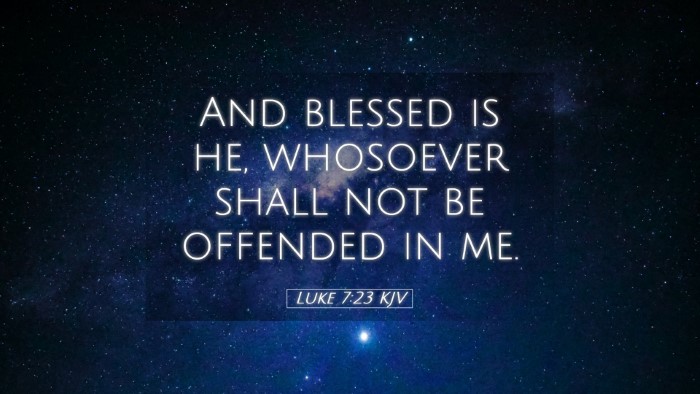Commentary on Luke 7:23
Verse Text: "And blessed is he, whosoever shall not be offended in me."
Introduction
Luke 7:23 is a profound statement made by Jesus within a broader narrative wherein John the Baptist, from prison, sends messengers to inquire if Jesus is the expected Messiah. This moment holds significant theological implications and provides insights into the nature of faith, expectation, and the character of Jesus’ ministry.
Contextual Analysis
In the context of Luke 7, we find John the Baptist in a place of questioning. Imprisoned for his fearless declaration of truth, John hears of the miracles performed by Jesus, and yet he is troubled, wondering if He is indeed "he that should come." This verse responds directly to the doubt echoed by John’s messengers; it emphasizes the blessedness of those who do not stumble due to the seeming contradictions between Jesus’ ministry and their expectations of the Messiah.
Theological Significance
This statement encapsulates the idea of “offense” in a theological framework. Both Matthew Henry and Albert Barnes comment that “to be offended in Christ” refers to a stumbling or falling away due to the perceived weaknesses or social challenges surrounding Jesus' Messianic identity. The term ‘offended’ also carries implications of disappointment; a notion where the actions of Christ seem inconsistent with people's preconceived notions of the Messiah.
Insights from Public Domain Commentaries
-
Matthew Henry:
Henry observes that Jesus’ ministry is characterized by humility and suffering, elements that are often stumbling blocks for those expecting a triumphant Messiah. He points out that Jesus promises beatitude to those who are able to look beyond the lowly circumstances of His earthly ministry and recognize His divine authority and mission.
-
Albert Barnes:
Barnes notes the emphasis on faith and the challenge of trust in Christ amidst doubts and trials. He explains that the "blessing" pertains not only to the spiritual state but also to the ultimate triumph found in believing without requiring tangible proof of one’s expectations. The blessed are those who understand that God's ways often transcend human understanding.
-
Adam Clarke:
Clarke brings attention to the historical context and the societal expectations of a military and sovereign Messiah. He contrasts this with the message of peace and redemption that Jesus embodies, which would have been a significant source of offense to those who anticipated a political savior. Clarke emphasizes the necessity of faith and the heart's posture needed to embrace the fullness of Christ’s redemptive work.
Challenges of Comprehension
In a broader theological discussion, this verse presents challenges in understanding the nature of Christ’s mission. Many contemporaries, much like John himself, faced the perplexing reality that the expected deliverance did not align with their realities. The offender is one who perceives Jesus’ demeanor and method as inadequate to achieve the fulfillment of God's promises.
Applications for Contemporary Faith
This verse invites modern readers and believers to consider their own expectations of Christ. Are there areas in which they find themselves 'offended’ or disappointed by the nature of God’s plans? This reflection encourages a deeper trust in God’s purposes, alongside a willingness to engage with Christ’s message of hope, even when it contradicts personal expectations.
Conclusion
Luke 7:23 serves as a central piece for understanding a profound aspect of discipleship: the call to trust in Jesus amidst doubt and the societal expectations placed upon Him. The rich insights gleaned from public domain commentaries serve not only to elucidate the text but also to challenge believers today to remain steadfast in faith, recognizing that blessedness comes through trusting in the broader picture of God’s redeeming work through Christ.


